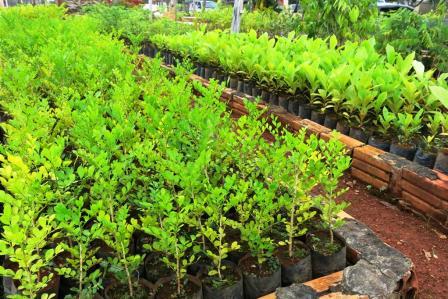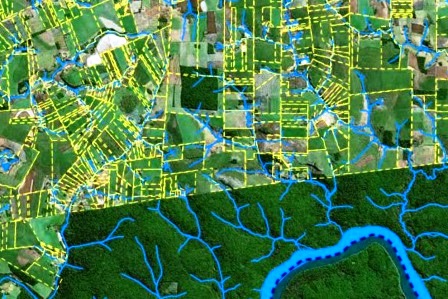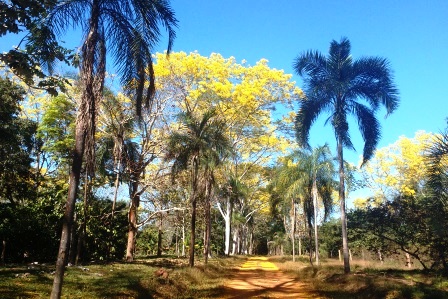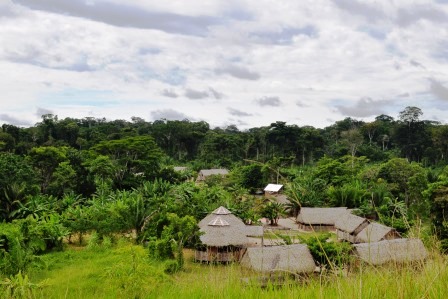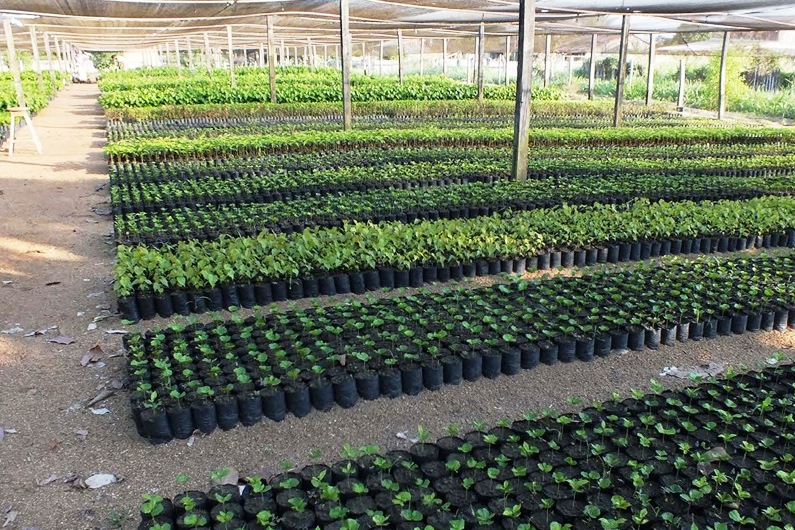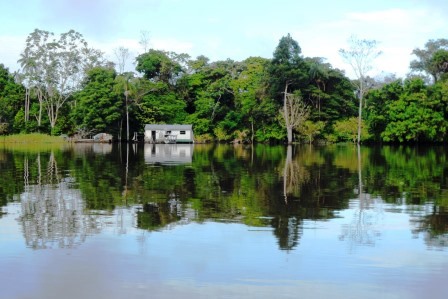Project selected under the Public Call “Amazon at School”
CONTEXTUALIZATION
Promoting school meals based on sustainable and socio-biodiverse products from family farming—including Indigenous Peoples, Quilombolas, and other Traditional Peoples and Communities—in the public education networks of the Legal Amazon aligns with the National School Feeding Program (PNAE), the Action Plan for Prevention and Control of Deforestation in the Legal Amazon (PPCDAm), and the Amazon Fund.
This strategy simultaneously contributes to the conservation and sustainable use of the “living forest,” biodiversity preservation, and deforestation reduction, while strengthening sustainable production chains, increasing income generation, diversifying markets, valuing socio-biodiversity, and promoting social justice.
The increase in quantity, quality, regularity, and diversity of sustainable and socio-biodiverse production, driven by public procurement programs, strengthens the productive capacity, production infrastructure, short marketing circuits, and distribution channels of family farming in these groups. It also ensures students access to nutritious, healthy, and culturally appropriate meals, respecting local eating habits, promoting regular nutrition, reducing food insecurity, and positively impacting learning—even in the face of infrastructure and educational quality deficits—by aligning public network demand with existing territorial productive potential.
Given the potential to support sustainable school feeding in the Legal Amazon region and the convergence of the aforementioned public policies, the Public Call “Amazon in the School – Healthy and Sustainable Food” is part of a partnership between BNDES and the National Fund for Educational Development (FNDE), the Ministry of Agrarian Development and Family Farming (MDA), the Ministry of Social Development, Family and Fight Against Hunger (MDS), and the Ministry of Environment and Climate Change (MMA) to implement joint actions promoting school meals from sustainable and socio-biodiverse family farming, including Indigenous Peoples, Quilombolas, and other Traditional Peoples and Communities.
Two proposals were selected for the state of Pará and one for each of the other states in the Legal Amazon, totaling ten proposals aimed at promoting integrated actions to strengthen sustainable and socio-biodiverse food production by family farming and Traditional Peoples and Communities, and the acquisition of such foods for school meals in public education networks in the Legal Amazon.
THE PROJECT
The project integrates efforts to strengthen, in an articulated manner, the sustainable production of food by family farmers, including Indigenous Peoples, extractivist communities, riverine populations, and other Traditional Peoples and Communities, as well as to enhance their qualified participation in the school feeding programs of public education networks in the state of Acre.
Implemented by the Associação SOS Amazônia, in partnership with the Comissão Pró-Indígena do Acre (CPI-Acre) and municipal and state-level institutions, the project is structured around the public call "Amazônia na Escola: Comida Saudável e Sustentável", funded by the Amazon Fund and supported by an interministerial coordination involving Ministry of Social Development and Assistance, Family and Fight against Hunger (MDS),Ministry of Agrarian Development and Family Agriculture (MDA),Ministry of Environment and Climate Change (MMA),National Fund for Educational Development (FNDE), and BNDES.
The component Cross-cutting Activities (A) includes:
- (A1) a detailed diagnostic phase, which will produce a comprehensive work plan to define priorities, investments, and beneficiaries for Components B and C;
- (A2) community mobilization;
- (A3) dialogue, dissemination, and capacity building on the National School Feeding Program (PNAE);
- (A4) a lessons-learned report;
- (A5) strengthening governance and social control of the PNAE at state and municipal levels;
- (A6) communication activities; and
- (A7) gender and youth-focused training and engagement.
The component Strengthening Food Production (B) comprises:
B1: Capacity building and technical support for family farming:
- (B1.1) training and technical support for diversification and expansion of productive systems;
- (B1.2) training on social organization/associativism and cooperativism, territorial, environmental, and enterprise management, and the expansion of market access;
- (B1.3) support for issuing documentation necessary to access public policies.
B2: Strengthening productive infrastructure:
- (B2.1) implementation of social technologies;
- (B2.2) establishment of nurseries, processing units, agroforestry systems, fish farming units, poultry structures, and acquisition of equipment and vehicles.
The component Strengthening Food Procurement and Consumption (C) includes:
C1: Capacity building and technical support for public-school networks:
- (C1.1) training on the stages of PNAE implementation;
- (C1.2) promotion of best practices;
- (C1.3) training in recipes featuring products from sociobiodiversity;
- (C1.4) food and nutrition education;
- (C1.5) technical assistance provided by Local Agents.
C2: Strengthening the infrastructure of public-school networks:
- (C2.1) improvements to school infrastructure—including kitchens, food processing areas, transportation systems, storage, energy supply, and internet connectivity.
Finally, component Project Management (D) includes:
- (D1) technical coordination of work fronts;
- (D2) monitoring and follow-up of activities; and
- (D3) financial oversight and reporting.
Among the project’s expected outcomes are the expansion of the productive capacity of family farmers, Indigenous Peoples, and other Traditional Peoples and Communities; the strengthening of local organizations; and the increase in the commercialization and procurement of healthy foods from family farming, generating direct positive impacts on the quality of school meals.
The project also aims to contribute to raising awareness within the school network, strengthening the application of procurement procedures for family-farming products, enhancing institutional environments for the implementation of PNAE, fostering civic and food-related awareness in food security forums and schools, and increasing and valuing the participation of women and youth in PNAE.
INTERVENTION LOGIC
This project falls under the “Sustainable Production” (1) and science, innovation and economic instruments” (4) components of the logical framework of the Amazon Fund.


